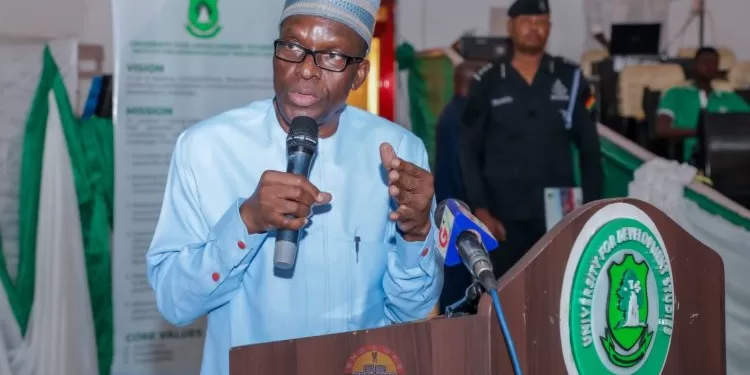The Speaker of Parliament, Mr Alban Sumana Kingsford Bagbin, has called on the Electoral Commission (EC) to conduct the 2024 general election with integrity, transparency, and trust.
He said the EC must prioritise the will and safety of the voters and the stability of the country.
“The EC should work to attain transparency in its processes, and integrity in voter registration to build public trust,” Mr Bagbin said at the Eighth Harmattan School of the University for Development Studies, Tamale, on the theme: “Accountable Governance, Violent Extremism and the 2024 Elections.”
“The Commissioners of the EC and their entire Staff, whether permanent or temporary, must spare a thought on the sanctity of the electoral process, the safety of the voter, the protection and security of political parties, and the stability of the country,” he said.
The Speaker also called on the various political parties to play to the rules and regulations governing the voting process instead of taking rigid positions on issues, adding: “We have a nation to build in peace and we must all be committed to that.”
Mr Bagbin indicated that the present circumstances, particularly the happenings in the sub-region, made the theme very apt.
He explained that the past three years had witnessed a series of military coup d’états in sub-Saharan Africa as well as pockets of extremism in the sub-region, which demanded sober reflection to understand the causes and undercurrents that had given rise to those situations.
The Speaker said the challenges that resulted in military interventions, which ultimately curtailed the democratic processes, could only be resolved when leadership was accountable to the people.
The journey to accountable governance required transparency in the government’s decision-making processes and access to information about government activities and policies, he noted.
Quoting the American Actor, Mike Erwin, to emphasise his point, he said: “Exhibiting accountability over time is a gateway to trust. When we see someone acting with accountability, we gain the evidence we need to trust them.”
Mr Babgin said accountability mechanisms that held public officials responsible for their actions, the existence of strong legislative and independent oversight bodies, as well as a judicial system free from political interference were critical in demonstrating transparency and trust.
Therefore, citizens must be encouraged and assisted to participate in governance through various forms of engagement that would ensure that government policies were responsive to the needs of the people.
The Speaker said in the current global geopolitics, violent extremism was becoming a great source of worry because of its linkage with terrorism and the significant threat it presented to global security.
He said the reversals of democratic governance that had been witnessed in West Africa had come with some forms of extremism.
“What it tells us is that if we do not remain steadfast on our democratic journey, we will soon get derailed by political extremists, who invariably have linkages with different shades of terrorist groups.
The destabilisation of our sub-region that will ensue will have very dire consequences for us all,” he said.
On mitigating violent extremism, Mr Bagbin called for using education as a potent tool to help build resilience and mitigate this phenomenon.
“It strengthens commitment to non-violence and peace by addressing hateful and violent narratives. Citizens’ engagement and participation in the issues that affect them also lowers violent extremism.”
“Besides, violent extremism can be linked to poverty, marginalisation, and excessive politicisation of national issues. Managing these through economic development, social inclusion, and political participation is in itself an exercise in managing violent extremism.”
“It will also help to promote inter-party dialogue, mutual understanding and tolerance among the different political groups,” he said.
The Speaker urged the media to demonstrate a high sense of responsibility, given the essential role they played in shaping public opinion about the fairness or otherwise of an electoral process.
Touching on the political parties and their communicators, Speaker Bagbin urged them to do away with indecent and abusive language on air, whilst their leadership advocated tolerance and respect during the election period.
“Civil society organizations (CSOs) should focus on preventing electoral violence and ensuring a free and fair process,” he noted.
He called on the nation to open its doors to the international community to support and monitor the 2024 general elections as that enhanced accountability and stability.
“I appealed to Ghanaians to be accommodating, considerate and loyal to the state instead of being excessively reactive in every little situation that arises.”
“Let us all rise to the occasion and ensure a free, fair and transparent 2024 elections,” he said.
As part of activities marking the event, Mr Bagbin launched a $100,000 UDS Research Fund, which would provide financial resources in the form of grants to qualified persons (faculty, staff, and students among others) for purposes of conducting relevant (applied, problem-solving and interdisciplinary) research for the socioeconomic development of northern Ghana and beyond.
He, therefore made a personal donation of GH¢ 50,000.00. as seed money to the fund.















